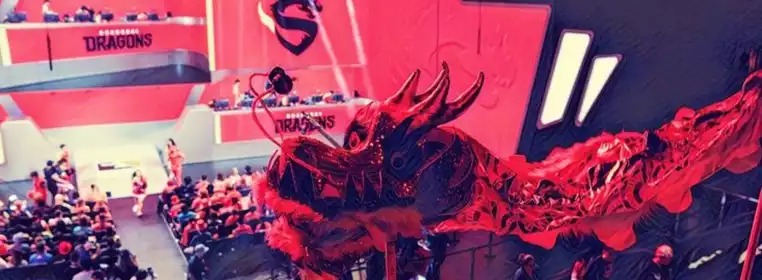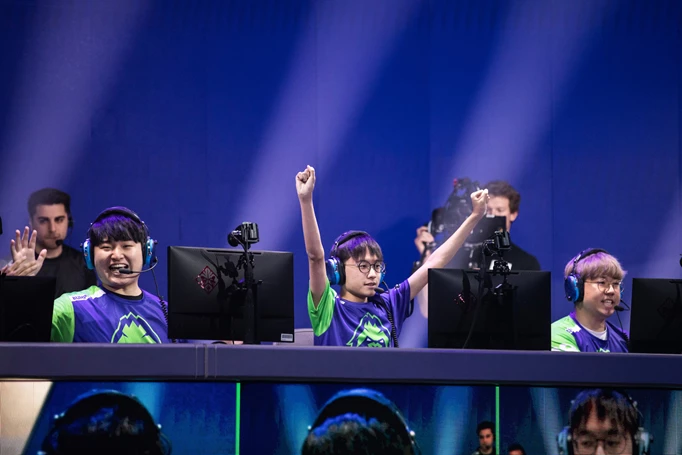How Strong Will Roster Depth Be In Overwatch League’s 2021 Season?

Looking at the 2020 Overwatch League season, packed with its travel and assumed patch cycles, it was clear that roster depth was going to be an important metric of success throughout the year. While COVID and Hero Pools poked holes in that theory, we now enter 2021 with two assumed regions and two wildly different roster-building philosophies.
The West has been incredibly vocal in how some of their rosters are “lean and mean” while Asia is expanding and investing into Overwatch Contenders and already have maxed out their Overwatch League roster.
Many Overwatch League coaches have spoken on the difficulty of both managing and planning for large rosters. We’ve seen it attempted by teams like Atlanta Reign, London Spitfire, Seoul Dynasty and many others and their performances have varied across the league.
For example, when speaking to Florida Mayhem general manager, Albert "yeHHH" Yeh, he voiced his thought process regarding roster building in a recent interview with GGRecon. He said: “Coming into the 2021 season, the theme is going to be lean and mean. COVID hit every team differently, I mean it hit every team, honestly speaking, and ours is no exception to the rule. So we are on a little bit tighter of a budget this year, but to make up for it, we’re going to go a little leaner. We’re going to be spending appropriate money at each position to make sure we have super solid pieces at each position.”
However, this thought process stands opposed when you look at the Asia region and their philosophy regarding roster building for the 2021 Overwatch League season.
The Hangzhou Spark have a massive twelve-man roster stacked to the brim with both ends of the player spectrum, both tenured veterans and aspiring rookies. After a tumultuous and inconsistent season, the Chengdu Hunters don’t seem to be too far off the western thought process, and yet they are on track to be one of the only teams, thus far, with both an assumedly plan to utilise the new two-way contracts alongside their new amateur team, Team Chaser. The Shanghai Dragons, while leaner than they were last season—at least thus far—still look to have a wider bench filled with impressive players, something they utilised to a great degree just last season. The separation is as clear as the sky is blue. There are, at least, two different fundamental philosophies in terms of the roster size discussion, however, where exactly do either two shine when it comes to performing in the Overwatch League?
In theory, having a deep roster seems ideal in an ecosystem like the Overwatch League; being able to always have a strong practice partner, being able to hide strategies, and having the depth in your bench to allow metagame fluidity as well as player breaks as they’re necessary. Practice is one thing, but even having an equally world-class roster to warm up with on match day is something any team would ideally love to have. This is something we heard about, even if to a smaller degree when it came to certain academy teams.
However, we have to address the elephant in the room; it does not have a glowing track record. With the advent of the Hero Pool format, this opens up a real discussion around having a deeper roster actually providing more benefit than it taxes you. 2020 was on track to become the year we really see depth thrive. We had massive travel considerations teams had to work around, along with the aforementioned Hero Pool format, on top of the myriad of other patches and change Overwatch was set to see that year. Obviously one of those struts gave way, but travel could and should still be a consideration for the future of this franchised league. That alone could be the catalyst to seeing teams both have an increase in budget and a change in heart when it comes to roster depth across the board.

 Click to enlarge
Click to enlargeWhile the format of the 2021 Overwatch League season is still undecided, let’s presume for argument’s sake that Hero Pools persists in some variation. With how frequently we saw the metagame shift in 2021, having the ability to not only be able to play the most optimal heroes but also play them well. This is the ideal scenario but conveniently glosses over the reality of the situation.
Finding roles and practical avenues for all of the players on your team is pivotal. Finding and being able to set all twelve players up for success when Overwatch changes as often as it does is nearly an impossible feat. More often than not, benched players have a difficult time finding the proper practice. This is due to them being absent from active practice because of their role or sub-position within the team isn’t currently in use.
One thing people overlook when shouting from the hilltops that their favourite team lacks depth is the idea of shifting gears and making sure you don’t lose speed. Removing the colour for a moment, players aren’t just some substitutable piece of machinery that you can plug and play into any and all team environments. They are people—and those people have idiosyncratic things about them that could change the dynamic of the team. For example, let’s say a flex support is subbed out for someone on the bench. While this second player might seem like the perfect fit for the metagame, the coaching staff might not be quick to move because the first player has leadership qualities that the team relies on. There is always a give and take with rosters, and it rarely is as easy as we all want it to be on paper.
The strength of roster depth is not only dependant on the format of the 2021 Overwatch League season, but also requires heavy investment into strong support staff to not only keep their bench players bought into the team dynamic and plan but to also keep their mechanics and understanding at a world-class level.
This all places the premium on flexibility, specifically in one area, in Overwatch. That said, role fluidity is valuable, but it is a trait that needs some serious thought put into how it will work in practice. “Balance in all things” is a good lens to view this argument through. Deep but not too deep. Flexible but not confusingly so. Expensive but not excess. Finding the midpoint of all of these things, and the vast majority of other unnamed axes, resulting in a strong team.
All in all, this is a practical discussion of a wise adage, but in question form; “is perfect the enemy of the good?” While having a deep roster is optimal in theory, as Overwatch—both the game and its esports league—continue to become more and more granular, the more pressure weighs down on those involved. With that said, a large roster can be feasible, for those who can afford them, both in terms of economics and investment into finding the right players for the system.
What seems optimal today looks dated and confused tomorrow in Overwatch. Therefore, balance is the attribute we should look for when judging a team’s projected strength. Can this team play in any metagame? Are there too many cooks in the kitchen?
Is this team balanced?
Roster depth is not an attribute of a team that can be overlooked throughout Overwatch League’s 2021 season. If done correctly, it can become a serious weapon any team can use to challenge even the most certain of playoff teams. However, beware its double-edge, if a large roster is not handled correctly, star players and rookies can find themselves clamouring for news homes quickly.
Images via Blizzard Entertainment
